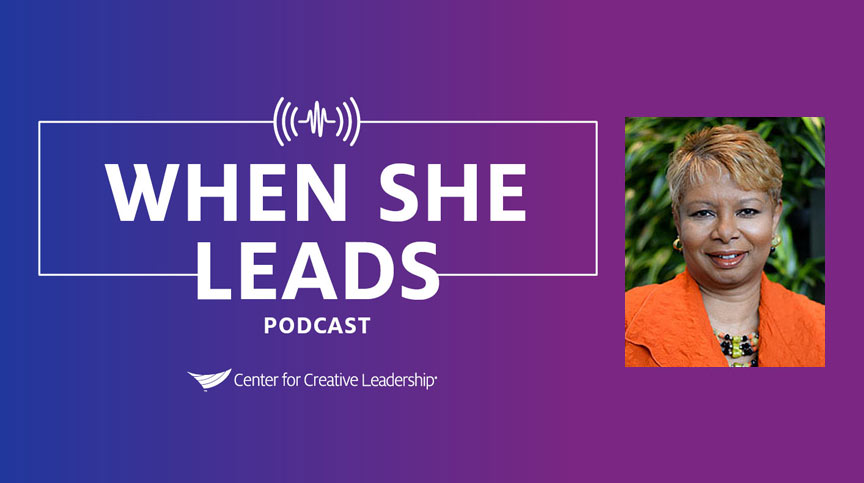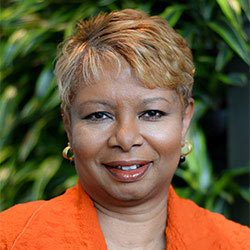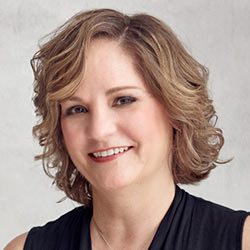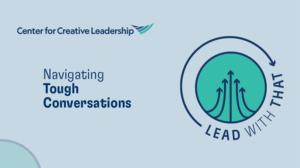- PODCAST
When She Leads: Women in Healthcare & Philanthropy

In this episode of When She Leads, our women in business podcast, we speak with Karen McNeil-Miller, President and CEO of the Colorado Health Foundation. Karen shares with host Jennifer Martineau her unexpected career trajectory and how she’s changed as a leader over time; the healthcare disparities among minority and migrant communities; and the challenges faced by women, particularly women of color, in the nonprofit, educational, and philanthropic sectors. Karen stresses that until equity is part of every institution’s culture, women of all races and ethnicities must get equal opportunities and access to leadership and mentors. Listen now or read the full transcript, below.
Listen to the Podcast
In this episode of When She Leads, Karen McNeil-Miller talks about her unexpected career trajectory, and how she’s changed as a leader over time. Listen now.
“I’ve forgotten now how certain I was when I was 32, how all my sentences ended in an exclamation point … Now, most of my sentences end in a question mark.”
Karen McNeil-Miller
President & CEO
Colorado Health Foundation
Interview Transcript
INTRO:
Welcome to When She Leads, a podcast from the Center for Creative Leadership that showcases the power of women in the workplace. We’re sharing stories of inspiration and impact from executives in a range of industries and organizations around the world. These are people who are making a difference by supporting women’s advancement and development … Because we believe when she leads, it’s ultimately about better outcomes for all.
HOST, Jennifer Martineau:
This is Jennifer Martineau, I am Senior Vice President of Research and Evaluation at the Center for Creative Leadership. And I have the honor today of speaking with Karen McNeil-Miller, the president and CEO of Colorado Health Foundation. Thank you for spending your time with us here.
GUEST, Karen McNeil-Miller:
Thank you for inviting me.
Jennifer Martineau:
We are wanting to get to know you first and give the listeners some context. So tell us your story.
Karen McNeil-Miller:
Well, as you said, I’m the president and CEO of the Colorado Health Foundation. I have been here a little over 3 and a half years. Previous to this, I was president of a smaller, heath-focused foundation in North Carolina called the Kate B. Reynolds Charitable Trust. Before that, I spent 16 years with you at the Center for Creative Leadership, and before that, I was an educator, teacher, and independent school administrator. And that journey has been certainly not planned.
For most of us in philanthropy, it didn’t start out as, we wanted to end up in philanthropy.
Jennifer Martineau:
Right.
Karen McNeil-Miller:
But I always wanted to be a teacher when I was a young child, and that was my life’s dream and so that’s how my career started.
Jennifer Martineau:
And you’ve been focused on education in some way, development, education throughout your career. How do you spend your time on a day-to-day basis at the Colorado Health Foundation?
Karen McNeil-Miller:
At the health foundation, we are devoted to bringing health within reach for all Coloradans. Right now, for a huge population of Coloradans, it’s not only not within reach, it’s not even within sight. So we focus on low-income populations across the state, whether they be urban or rural.
In the urban settings, there happen to be a lot of minority immigrant populations and we’re trying to give them the same access and opportunity for health that you and I enjoy. And those opportunities are not equal. And so we’re trying to reduce or eliminate the health equity gap. So the opportunities are unequal and the health outcomes are certainly not equal. So we’re trying to make those match.
Jennifer Martineau:
And how are you doing that? What are some of the major primary ways that you are trying to reduce that gap?
Karen McNeil-Miller:
Sure. Well, some things you might expect that are more traditionally thought of as health care. So we’re certainly focused on access to primary care for all kinds of folks. Here in Colorado, we’ve got huge rural areas of the state that don’t have a primary physician within 20, or 30, or 40 miles. And even then, it may be over a dangerous pass in the winter. So we’re certainly focused on access to primary care.
With children, we’re focused on children moving more and getting physical activity because we know the benefits that pays down the line. We are focusing on behavioral health, which is not only a Colorado issue, but a national epidemic with substance use disorder with children, particularly our young adults who are experiencing, suicidal ideation, depression, anxiety, at never-heard-of-before rates. And so we’re trying to address those issues.
And then, in the ways that are not traditionally thought of as healthcare. So we’re focused on things that are what we call the social determinants of health. So, if you don’t have safe, affordable housing, there’s a direct line of sight to the poor health outcomes your family will have. So we’re focused on affordable housing.
We’re focusing on access to food and not just eliminating food deserts in low-income communities. Whether they be urban or rural, just don’t have that access to healthy food within a few miles of where they live. So if you’re in an urban environment, you may have lots of food around you, but it’s going to be high caloric, highly processed food on the shelves of the local 7-Eleven on the corner.
Within a rural community there may not be a full-service grocery store again, for miles. And some communities don’t have any full-service grocery stores, so we’re trying to bring food, healthy food, and food accessible to folks around the state.
Since we’re talking about the work now, the actual work of the foundation, I’d love to spend some time talking about the challenges of developing women leaders on the ground in community to advocate for themselves and their families.
Jennifer Martineau:
Oh great. Please do.
Karen McNeil-Miller:
So we actively engaged in working with low-income communities, particularly Hispanic and other migrant or immigrant communities who tend to be heavily female and the women are the ones that we go to to talk about health
So women who may culturally be seen as, you’re the stay-at-home person, that you don’t seek a career, that doesn’t mean they can’t be leaders in the community and leaders of their peers in those communities around issues of health, around issues of how to advocate for your family with the school. How to advocate for yourself and be your own resource for your own health. How to navigate the health system and be your own advocate.
So we’re involved in efforts to train women on the ground, low-income women to organize, to teach, to promote advocacy on behalf of their communities. And it’s wonderful to see what happens when you empower a woman with some information, with some knowledge, and with the trust and respect that she can make a difference for her community.
Jennifer Martineau:
I can imagine some immense challenges that the women you’re working with are facing in terms of other’s expectations of them, given all of the ways in which they’re oppressed. Talk about some of the challenges that they face in learning that they can advocate for themselves and how to do that. And then also talk about some of the successes that you’ve seen happen when women in the community have been able to really lead in their own communities.
Karen McNeil-Miller:
Some of the challenges are structural for those women because of structural oppression. Some of them are cultural and there are culturally oppressive views and practices in communities. And then there is then the separate and distinct factors that has to do with an undocumented population.
So they have to not only overcome the barrier of, particularly now, in this day and time, be afraid to go in public to big institutions for fear of deportation. So you have to get them past that. But then when you can show them what they can do and how only they can do it. Because if you have a community that’s been oppressed and is not trusted of a major system, like a healthcare system, or an education system, or criminal justice system, or legal system, who they trust are each other.
And so to be able to empower them and give them information and allow them to go and be the trusted person, the wise person in their community, to get information that is going to be beneficial to their community whether it’s about health advocacy, whether it’s just letting an immigrant population know the responsibilities they have, or the opportunities they have for just vaccinating their children.
So in giving them that information gives them additional purpose that they see has benefit beyond their own families. And we’ve seen that with promotors in the Hispanic community. We’ve seen it in some of the migrant communities, particularly the East African and West African communities, that women are coming here with their families and really hanging out with their own people. And so, when you’re with each other, let’s make those opportunities. When you’re sitting with each other at the laundromat, when you’re sitting with each other in the park, make those opportunities to not only educate your sisters, but to help benefit or propel their families.
Jennifer Martineau:
Can you tell me about or describe one of the programs or the initiatives, some of the processes that you’re using to help women build that sense of empowerment and belief in themselves, and a responsibility to be the woman who’s engaging those conversations with her neighbors and with her sisters?
Karen McNeil-Miller:
Well, we first have to go through a trusted intermediary on the ground because they don’t know who we are, wouldn’t have any reason to know who we are and would certainly have no reason to trust us. So we go through an organization that they already know and trust, and have that organization kind of sponsor us with that community. So there’s that work of getting introduced to the community, getting the women to trust us and trust our intentions.
And then, we use all kinds of things. We have used organizations like Center for Creative Leadership to do training with those women. We have gotten them in, we’ve used local community colleges to get them English, more proficient English if they need that for the work that they want to do. We have local organizers come in and work with those women to tell them how they can organize within their own community.
There’s skill set involved in that. And so we help bring up their skill for organizing. Then we help them also try to manage their own networks. So for you to be able to take time to go out and do this organizing, then one of your other sisters may be the one who establishes child care, an in-home child care. That helps her income, it helps you and your family because you have someone you trust now with your children while you go out and organize or educate. And so we try to help those women work with each other and utilize their skill set they have within them to collectively manage and grow their communities, so that everyone doesn’t have to stay at home with their children.
Jennifer Martineau:
So that is a great story of what kind of positive impact you can see when you’re investing in women. Do you have any other stories that you would share along those lines? What kind of impact you see?
Karen McNeil-Miller:
In just the general nonprofit arena, we have invested in women’s leadership, primarily through a program that we are using through the Center for Creative Leadership to develop community leaders because we have come to understand that, particularly in rural communities, those aren’t places that are destinations for people along their career. So the people that you need to rely on to lead sustainable efforts in communities are the people who grew up there, who lived there, and want to stay there. And who may be in nonprofit roles that are entry level, second level, third level nonprofit roles.
But those are the ones in 10 years who are going to be running those very local organizations, and so we are investing in their leadership development and capacity as a cohort, so that when they collectively rise to power in those organizations, they already have a history together. They have a history of collaboration. They know how to lead collectively, as well as individually. And they know how to put their community first. And how to be strategists on their community’s behalf. They have a network that is the one they need to create power so that they can eliminate the power dynamic between the current and the future. They become a future power and in doing that, they’ve got a network, they’ve got a history together, and they’ve got a collective vision.
Jennifer Martineau:
And when that happens, and maybe it’s too early in the process, I don’t know, you tell me. But when that happens, what difference does it make for a community?
Karen McNeil-Miller:
Well, it hasn’t come to fruition here yet in Colorado. Yet, when I was in North Carolina and we did that 10 years ago, and those women have ascended into power. Whether they are at the health department, whether they’re in the police departments, whether they’re running major nonprofits. And the difference that it has made is that the collaboration is much easier. There’s much less territorialism and much more of a “we’re about the community, what can each organization bring to that?” They have banded together in some small counties in North Carolina to get one of their cohort elected to public office as city council or county commissioner, or school board. They have taken ideas collectively, put things up, got things on the ballot to change policy.
And those things are benefiting those communities in ways that had not happened in previous administrations, if you will.
Jennifer Martineau:
And doesn’t happen when people are operating as individuals with their own agendas or their own organization’s agenda, right?
Karen McNeil-Miller:
Exactly. And I think one of the things we’ve been best able to help women do is understand the notion of multiple loyalties. That you are not being disloyal to your institution if you also have loyalty to a collective. And the power of that.
Jennifer Martineau:
And you’re helping them to do that by helping them understand that their institution is there to serve the collective, right?
Karen McNeil-Miller:
Yes. And that certainly has applicability as well into the corporate environment or into corporate organizations, where you may be. You for example. You’re a VP of a vertical unit, but you also have horizontal responsibility for leading across the entire organization. And those are not mutually exclusive. You can do both of those, and do both of those well. And both your unit and the institution benefit when you are active in both.
Jennifer Martineau:
Right. And, you know, I’m thinking about the women in the low-income populations. Where is the challenge, where is the primary challenge for them? Is it in understanding that they can have multiple loyalties? Or is it much further back in the process and understanding some of the resources they have access to that maybe they’re not aware of?
Karen McNeil-Miller:
It’s the latter. It’s helping them understand the resources they have and resources they have in each other. And I think it’s also freeing when you help poor women or women of color understand the historical perspective of how they may have ended up in the situation they are in. But to help them understand the systemic oppression or systemic policies that were activated specifically to deny them access and opportunity.
And so once they understand that, then it takes it out of the realm of, “Oh, it’s not that I’m a failure. It’s the odds are stacked against me. And so for me to succeed, I’m going to have to do something different. But I also have an obligation to try to change that.”
Jennifer Martineau:
So, certainly you’ve described having to find the local intermediaries and the work that you’re doing in and of itself is very challenging, but you’re also working in the context of government policies and legislations and that kind of thing. So take it up a level to the challenges that your organization has in doing this work and in helping women really reach their potential. What do you run into?
Karen McNeil-Miller:
We constantly have to manage the power and privilege that the roles that we occupy have. So, we have to be mindful that we can’t go into community with the answer for them. That we disregard their life experience, their lived experience, and come in as if we know what’s best for them.
We then collectively bring the resources we have and the expertise we have, and marry it to the expertise and resources they have. So that’s a constant struggle and philanthropy in general does not do a good job at that.
Philanthropy in general, has the “We’ve got the money, we’ve got the power, and so you’ve got to do what we say.” So that’s a challenge in gaining access and trust into those communities.
And then there’s also the privilege piece. Because philanthropy in general, again, is at the top, very white male dominated. Now a lot of the workers in philanthropy, there are a lot of women in there. And some black women. But you have to realize that the wealth that created the vast majority, almost exclusively, created foundations today were built by white men.
And so those white men use their networks to staff their boards. They use their networks to hire their executor directors, and those networks didn’t extend to a lot of women, except white women. Certainly didn’t extend to women of color.
Jennifer Martineau:
You’re a pretty kick-ass leader. And you are a woman of color. I can’t imagine the barriers that you’ve brought into and the challenges that you’ve faced. Tell me about some of those and how you’ve gotten through them.
Karen McNeil-Miller:
So almost every role I’ve ever had, in some cases, I’ve been the first woman. But in almost every case, I’ve been either the first black or the first black woman.
I try not to focus on those barriers. Because if you reacted to everything, you would spend your entire time reacting to micro-aggressions. So it’s got to reach a certain threshold before it should get your attention.
Jennifer Martineau:
Yeah.
Karen McNeil-Miller:
So I have a pretty high threshold. But I have certainly had, I think this happens for women and for black women of course. I’ve certainly been the most senior person in the room, yet the client, whoever I’m talking to, talks to the white male who’s sitting beside me.
Jennifer Martineau:
Right.
Karen McNeil-Miller:
I’ve had instances where I’ve seen traditional advice that we give women, and when I say women, I mean white women, about how to succeed in the workplace. Those things typically backfire on black women.
So for white women, we say, “You know, you’ve got to speak up. You’ve got to be more aggressive. You’ve got to ask for what you want.” But when you do that as a black woman, then you very quickly get labeled as an angry black woman.
So you have to moderate that advice because of the perceptions that, the racial perceptions that come with it. When I look at – and have over the years – read thousands of articles on women’s leadership and women getting ahead in the workplace. And I always have to look at it through the lens of, “okay that might work for Jennifer, but that’s not going to work for Karen.”
And it’s going to work for Jennifer because she’s white. It’s not going to work for Karen because I’m black. Or Jennifer is smaller and more petite, but I’m, my stature is such that it could be threatening in the first place because I’m tall, and you throw on a pair of four-inch heels, and can be imposing. And so some of those things I’ve had to learn to mitigate because of that.
And in the course of my history, of my career, most of my sponsors have been white. White men and white women. And I think now there are women who are of my age and have come through that career path, I’m hoping that the 32-year-old woman, the 32-year-old black woman in my organization is not going to end up when she’s 62, saying, “All of my sponsors were white.”
Jennifer Martineau:
Right.
Karen McNeil-Miller:
I want her to be able to say, “I had these great black women that just took me under their wing, and not only mentored me, but sponsored me.” I think women of color in general have been over-mentored and under-sponsored and I certainly hope that I am contributing to the development of the women I’ve come close to, that I interact with, that I sponsor so that they don’t have those same stories.
Jennifer Martineau:
Well, when you talk about that wish, that the 32-year-old woman of color has a sponsor who looks like her, who represents her, that demands that women of color are ascending to senior levels in organizations because that’s who the sponsors are generally. So, what are you doing for women, and particularly women of color as you’re sponsoring them? What does it look like?
Karen McNeil-Miller:
Well I try to expose them to any and all that I have in my network. Anyone I have in my network. I am very deliberate about their formal leadership development opportunities that gives them the opportunity to learn and grow and also develop their own network.
Those that I work with closely, I give them the tough love. It’s, “Here’s what’s going on with you. For you to progress, here are the things I see that you need to work on.” And I am, now that I’m, like 61, almost 62, I get it. And so, I’ve forgotten now how certain I was when I was 32. How all my sentences, when I was 32, ended in an exclamation point. Now, most of my sentences end in a question mark. So I get that, and I can remember that. And I also try to tell them, “Don’t lose it too quickly. But don’t use it too often.”
Jennifer Martineau:
Yeah, that’s the reaction I’m having. Is it a good thing that you’ve transitioned to your statements ending in a question mark, or do you want women to hold onto that exclamation mark longer?
Karen McNeil-Miller:
Well, I want them to hold onto the exclamation mark as far as their drive, their ambition, their intellectual curiosity, and willingness to learn. Where I was at 32, and 35, was I had all the answers and you couldn’t tell me anything. That was the exclamation point. Now, it’s, “okay, now I realize things, decisions that I would have questioned at 35, I still might question at 62, but at least now I understand, what all they had to go through to get to that decision.” I understand more of the variables now, I have much more respect for the nuance of the challenge that I had then. So I want them to still challenge those decisions, but with a greater understanding than I had.
Jennifer Martineau:
Let’s talk about women in philanthropy, What else needs to happen so that they have access to sponsorship? What is the industry like? And what needs to change so that women, both white women and women of color, are getting access to sponsorship and are getting those opportunities to develop in the ways that you would want them to develop so that the philanthropic field can become much more diverse in its senior leadership?
Karen McNeil-Miller:
Mm-hmm (affirmative). There are a lot of things changing on the landscape now. If you looked at the top 50 foundations by asset size, you know probably a third of those are, probably half of those are owned by women and a third are run by black women. And so the field is picking up on that. The challenge, I think for us, and I came in in philanthropy at the CEO level, so I didn’t have to work my up through the ranks. For those young women who are coming in now and wanting to work their up through the ranks, there are some structural barriers in their way.
One is that these are some of the best jobs on the planet. So people don’t leave them a lot. So there is not a lot of opportunity to move up in an organization. Most foundations, 80-90% of foundations have staffs smaller than 25.
Jennifer Martineau:
Right.
Karen McNeil-Miller:
And they’re flat. So there’s not a lot of upward mobility built into the institution or into the field because they are relatively flat. They’re relatively small staffed. And so, what you end up doing is, I know a lot of younger black women who leave the field to become consultants back to the field. Particularly around areas of diversity, inclusion, working in urban populations, developing programs for black communities, that kind of thing. So that structural barrier will still be there.
Jennifer Martineau:
I can imagine some opportunities the field could take on to say, “We want to provide developmental opportunities, even if there’s not an upward mobility path that is as frequent as in other fields.” But does the field do that, or is that up to individual managers?
Karen McNeil-Miller:
The field has some programs specifically to advance women in philanthropy into leadership roles and other programs specifically to advance people of color. In general, the organizations that do the best job, the philanthropies that do the best job of developing women leaders and having that as a focus, are women’s foundations. Most every state has a women’s foundation, and that’s just their DNA, that they’re about promoting and developing women and girls across their footprint, but also around promoting and developing women in the field of philanthropy.
So there are some formal programs. There are certainly informal networks. There are, regional groups. There’s an African-American group Association for Black Foundation Executives. There’s Hispanics in Philanthropy. There’s Asians-Americans in Philanthropy. There are Women in Philanthropy programs. So there are efforts ongoing to do that.
Jennifer Martineau:
Is there anything that I haven’t asked about that you think is important for people to hear in terms of the whole topic of women leading?
Karen McNeil-Miller:
I do think until it become just institutional DNA, that women of all races and ethnicities get equal opportunities and access to leadership and mentors. Until it becomes just institutional DNA, it has to be intentional. That it has to be called out. It has to be a specific focus and these kind of programs and efforts will continue to exist until and unless it just becomes part of the air. And I don’t see that it’s part of the air yet, so I still think there is a role for intentionality. And not to fall prey to the, “Well we’re in a post-racial…”
Jennifer Martineau:
Yeah.
Karen McNeil-Miller:
“We’re in a post-gender environment where everything’s equal.” And to not believe that because it isn’t true. Thus the intentionality has to still be there, and not to let people talk you out of, do you need a women’s program in 2018 or 2019? It’s almost 2020. Do we need a program just aimed at women? Yes.
Do we need a program just aimed at minorities and people of color? Yes.
So until it becomes the DNA, it has to still be something that we intentionally activate.
Jennifer Martineau:
How do you and the foundation overcome or address pushback that you get, and I’m assuming you get it, when people say to you, “Why are you focused on these populations? Why aren’t you focused on other populations that also need help?”
Karen McNeil-Miller:
Well, yes. We get that all the time and so we go back to who have the poorest health outcomes? Low-income people. Including low-income whites. Low-income minorities, minorities in general, but particularly low-income minorities. So those are the people for whom health is furthest in reach. Those are the people who have so many other things going on in their lives that they don’t have the luxury of being able to worry about their health. They’re worried about keeping a roof over their head. They’re worried about, “do I make enough money to pay this bill or do I let this bill go? Do I have enough to money to feed my family?”
So they don’t have the luxury of worrying about “did I get my annual physical? Did I get a flu vaccine?”
So we’re working with those populations because those are the populations that have the poorest health outcomes, and the least access to make it better for themselves.
And I’ve really been able to make progress with, conservative white men, about this notion of equity. I play dumb, so I’d say, “Explain to me, do you play golf? Explain to me what a handicap is; how does that work?” And they’ll explain a golf handicap to me and I’ll say, “Oh, so golf created a system, so that no matter who you’re playing with, everybody has an equal chance to win.”
And they go, “Yeah.”
And I say, “Golf created an equity program.” That’s what we’re trying to do with health.
Jennifer Martineau:
That’s brilliant. Does it resonate for people when you share?
Karen McNeil-Miller:
It does. Then I get a blank face. It’s like, oh. I said, “So you are participating in an equity system, a handicap system is an equity system designed to bring equity to the game so that everybody has an equal chance of winning. Because what fun would it be?”
Jennifer Martineau:
Right.
Karen McNeil-Miller:
Why would you have any interest in going out and playing somebody you knew you weren’t prepared to beat? So they created a system to give an equal shot. That’s what we’re trying to do with health.
Jennifer Martineau:
That’s really interesting. I love that. And so then, same question, but thinking about developing women in you industry, in the philanthropic field, do you get pushback about why you are focused on developing other women professionals in the field vs men?
Karen McNeil-Miller:
No, I don’t because I equally do both, men and women. But I’m intentional that I equally do both.
Jennifer Martineau:
You intentionally equally do both?
Karen McNeil-Miller:
So it’s not an accident if a woman gets developed. Currently there are like 16 middle managers up through me. And 10 of those are women. And when I got to the foundation, I said, “The diversity that we’re lacking, part of the diversity that we’re lacking in this organization are men. We don’t even have white men.”
Jennifer Martineau:
Why is it important for you to have that kind of diversity in your staff?
Karen McNeil-Miller:
It is important because the people whose lives we are trying to work with to help change the trajectory of their lives are a multi-faceted, multi-ethnic group of people. And who have various lived experiences. We need a staff that reflects that variety of lived experience and variety of cultural experiences so that we can not only be credible out in the community, but that we can even more quickly advance our mission.
So it’s mission-critical that we have a diverse staff. It helps us in our values of not only diversity, equity, inclusion, but our value of authenticity, our value of listening to community, our value of being purposeful and aggressive about eliminating health inequities. We have to demonstrate. We don’t have any credibility externally if we can’t show that we’re serious about it internally as well.
Jennifer Martineau:
So, if you had advice for your younger self, what would it be?
Karen McNeil-Miller:
Say yes more often. I would tell myself to say yes more often and say yes more quickly. I would, I never turned down an opportunity that was offered to me, but I was close several times. I was close to turning down going to Colorado Springs when I was at CCL because I’d never lived anywhere but North Carolina and my family were here and I was afraid and scared, and so I eventually said yes.
Jennifer Martineau:
That’s good.
Karen McNeil-Miller:
Say yes and you’ll love it. Take that risk and don’t overthink it. Don’t obsess about it, just say yes. Because it’s all going to just lead to the next yes.
Jennifer Martineau:
Is there anything that I haven’t asked you about that you wanted to make sure that you share?
Karen McNeil-Miller:
Oh, I did want to talk about one of the questions that you didn’t ask me was how I got interested in this kind of leadership development for women.
And it all really got started when I came to CCL. When I arrived there, breaking the glass ceiling had just been published and so there was all of that kind of hoopla around that. And the center being known for that. And then shortly after that when Ann Morrison went to do the research for her next book, which I think was called The New Leaders: Leadership in a Diverse America or Leadership Diversity in America. I went to her and said, “How can I be a part of this?” And so I became one of the interviewers for that project.
And it was through listening to the stories of the women that we interviewed and the conversations we had as kind of a research team that really just solidified my interest in women’s leadership development.
Jennifer Martineau:
And got you into working in that space and becoming and developing yourself in that way as well.
Karen McNeil-Miller:
Mm-hmm (affirmative). Exactly. I wasn’t very enthused about it up until then. It had been kind of haphazard and I kind of fell into things, but it really honed in on me, the intentionality and the things I needed to be mindful and using the language of today’s kids, woke, as a woman leader. As a woman trying to navigate institutional leadership.
Jennifer Martineau:
I came to it in a similar way, sort of by accident if you will. And in doing so, realized where the barriers were that I hadn’t realized were barriers. Because I thought everybody faced them.
Karen McNeil-Miller:
Mm-hmm (affirmative).
Jennifer Martineau:
That kind of thing. So it did; it gave me some of that sense of being woke. But I keep waking up more and more every day. Well, Karen thank you so much for the time that you’ve taken for the interview for the podcast.
Karen McNeil-Miller:
Thank you for inviting me.
Guest featured in this episode of When She Leads:

Karen McNeil-Miller describes social and human impact as the center of her life’s work. Her career has been dedicated to making a difference in the world, through roles in education, leadership development and nonprofits. She is currently the President & CEO of the President & CEO of the Colorado Health Foundation and an active board member for the Center for Creative Leadership. Previously, she served as president of the Kate B. Reynolds Charitable Trust.
Host of this episode of When She Leads:

Jennifer Martineau is the former Senior Vice President, research, evaluation, and societal advancement at CCL, where she was responsible for global research and evaluation initiatives and our work focused on leadership development in the social sector. She recently co-authored Kick Some Glass, a guide for motivated working women in business who want to take charge of their own success.
Sign Up for Newsletters
Don’t miss a single insight! Get our latest cutting-edge, research-based leadership content sent directly to your inbox.








